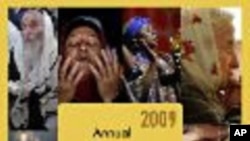<!-- IMAGE -->
The U.S. State Department's annual report on world-wide religious freedom, released Monday, was critical of what it says are international efforts to limit free speech in the name of combating defamation of religion. The Organization of the Islamic Conference, or OIC, has been pushing such anti-defamation measures in U.N. bodies.
The State Department report says the United States deplores actions that show disrespect for religious traditions, including Islam.
But it says the broad anti-defamation measures being sought by the Islamic Conference would have the effect of curbing debate about religious issues and should be discarded in favor of outreach and government defense of religious freedom and free speech.
The comments were the most prominent to date by the United States on efforts led by the OIC to get anti-defamation resolutions approved in the U.N. General Assembly and the U.N. Human Rights Commission.
In comments introducing the annual report, Secretary of State Hillary Clinton said the United States will always stand against religious-based discrimination and persecution, but that it strongly disagrees with those who would combat such problems by curbing free speech.
"The best antidote to intolerance is not the 'Defamation of Religions' approach of banning and punishing offensive speech, but rather a combination of robust legal protections against discrimination and hate crimes, proactive government outreach to minority religious groups, and a vigorous defense of both freedom of religion and expression," said Secretary Clinton.
The Congressionally-mandate report covering 189 countries and territories includes sharp criticism of the record on religious issues by countries also listed by the United States as major human rights violators, including Iran and North Korea.
Iran is cited for creating a "threatening atmosphere" for nearly all non-Shi'ite religious groups, notably Baha'is, as well as Sufi Muslims, evangelical Christians and Jews. It says Iranian President Mahmoud Ahmadinejad continues a "virulent anti-Semitic campaign," questioning the existence and scope of the Holocaust, the Nazi extermination campaign against European Jews.
The report says there has been no change in the extremely poor level of respect for religious freedom in North Korea, where some of the as many as 200,000 people held in political prison camps are reportedly there for religious reasons.
Assistant Secretary of State for Democracy, Human Rights and Labor Michael Posner said China, where President Obama is expected to pay an official visit next month, tends to conflate religious expression by Tibetan Buddhists and Muslim Uighurs in western areas with issues of autonomy and independence.
"Buddhist priests and monks that raise human rights issues are targeted," said Michael Posner. "The same thing is true in the Uighur autonomous region with Muslim clerics and others. The government has cracked down very severely since the violence there some months ago against religious leaders and others of the Muslim faith."
China has long been listed as a "country of particular concern" by the State Department for its record on religious freedom, as has U.S. Persian Gulf ally Saudi Arabia.
Assistant Secretary Posner said the United States supports Saudi King Abdullah's initiatives for interfaith dialogue, but that religious freedom in that country remains a subject of great concern.
"People aren't allowed to openly practice their religion, if they're not Muslim," he said. "There is still a religious police that interrupts people, even in private settings. And we have still the concerns about the text books, which continue to be disseminated not only in Saudi Arabia, but [also] around the world - to madrassas, for example, which still contain things that we consider beyond the pale."
The report credits several countries with positive interfaith steps, including Jordan and the Philippines, and says conditions have improved in Vietnam, Cuba and some Central Asian states.
But Burma is criticized for "systematically" restricting human rights efforts by Buddhist monks, and concern is expressed about anti-Jewish incidents in Venezuela.
Assistant Secretary Posner said the State Department expects to issue, by year's end, a new list of countries of particular concern on religious freedom, which would be subject to possible U.S. sanctions.
The current list, issued at the close of the Bush administration, includes Burma, China, Eritrea, Iran, North Korea, Saudi Arabia, Sudan and Uzbekistan.




